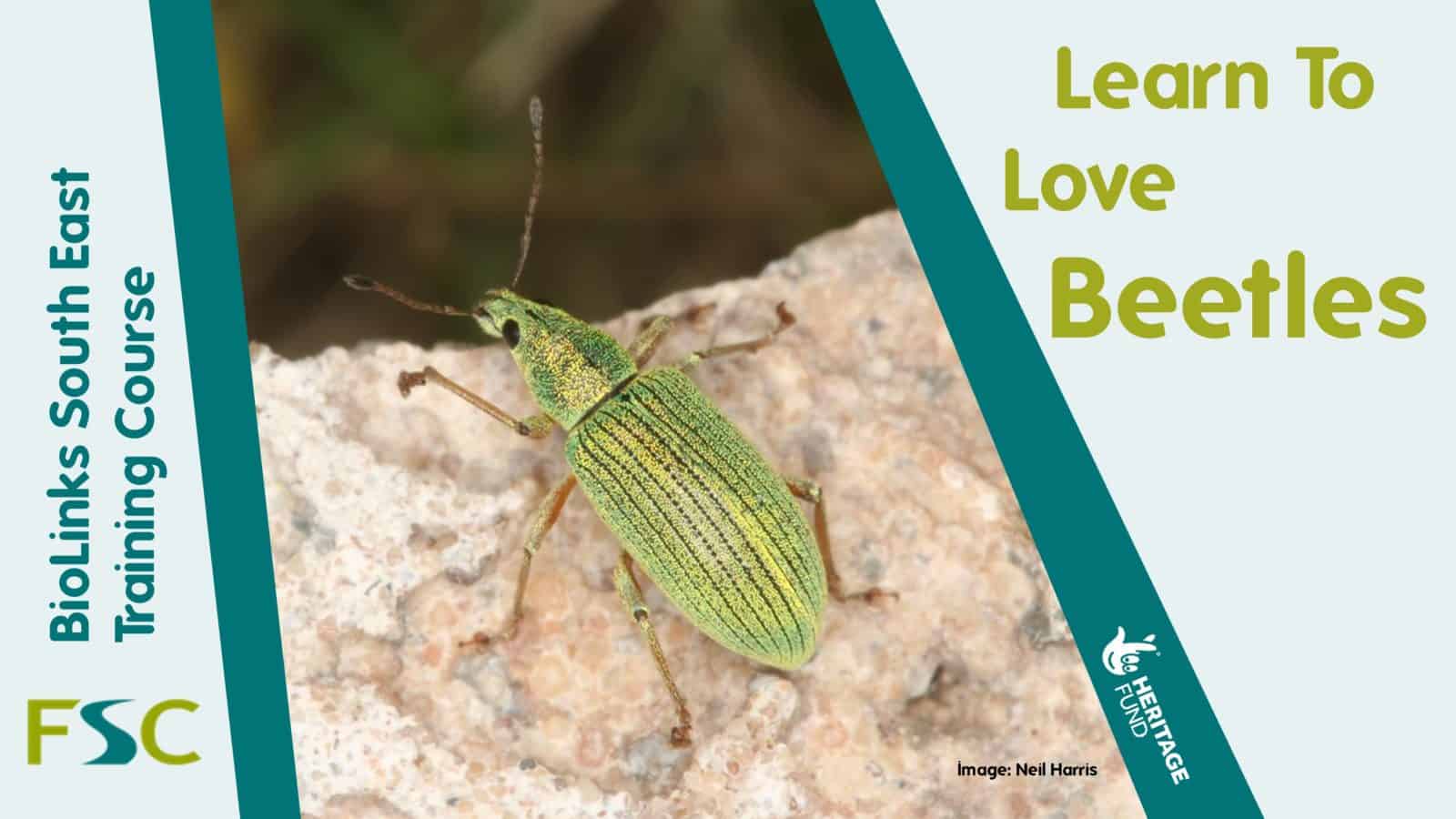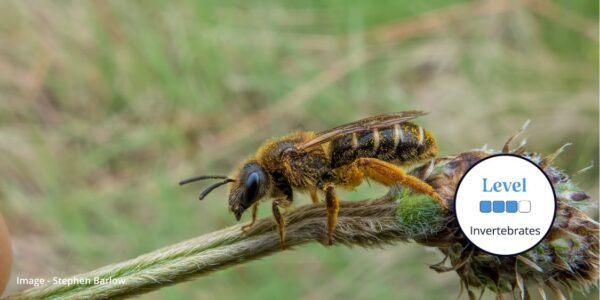If you’re interested in finding out more about beetles but don’t feel ready for a beginner’s ID workshop, then this is the course for you. Learn To Love Beetles is a very gentle introduction to to one of our planet’s most diverse insect groups, introducing aspects of their biology, ecology and behaviour.
This course combines the use of classroom-led learning and outside learning opportunities led by one of our beetles tutor to give individuals the skills and confidence to learn more about the lives and ecological roles of beetles.
- Certificate upon course completion.
- Please email [email protected] if you have any questions.
- Please note that this course is NOT a species identification course and will only go as far as categorising beetles into broad ecological categories.
This course is aimed at adults only and course attendees must be at least 18 years old in order to attend.
What will be covered during this course?
-
- Recognising beetles from other similar looking insects and discussing their place in the animal kingdom.
- An introduction to beetle biology, including their anatomy and morphology.
- An overview of the species diversity of beetles in the UK
- The ecological roles of different groups of beetles.
- How to go about finding wild beetles in different habitats.
See the ‘Example Timetable’, ‘What’s Included’ and ‘Before You Attend’ sections below for more information about this course.
Course Fees
Regular Price: £75 For professionals and residents outside of the UK. Select ‘Attendee: In Person’ Sold Out
Subsidised Price: £10 Subsidised by the FSC BioLinks project for non-professionals eg. volunteers, biological recorders, wildlife gardeners, amateur naturalists and students.Available to UK residents only. Select ‘Attendee Subsidised: In Person’
Tutor: Dan Asaw
Dan is a keen educator and Coleopterist. He has experience working within education as a teaching assistant and loves the opportunity to share his experiences and knowledge with a range of audiences. Dan's interest in invertebrates started at a young age and as a teenager he was already rearing praying mantids in his bedroom. From there, he began rearing exotic invertebrate disease vectors for scientific research at the London School of Hygiene and Tropical Medicine.
In his spare time, he has volunteered integrating UK beetles into the Natural History Museum Collection. He is often found digging through wood piles and utilising a variety of trapping methods to find and identify beetles. He is an active member of the Herts Invertebrate project and Hertfordshire Natural History Society, and has helped generate some significant county records in this capacity.
Covid Measures
In order to keep our customers and staff safe, we ask that anyone attending our centres:
- Wears a face covering when in shared indoor space (unless exempt).
- Maintains social distancing.
- Cleans their hands regularly.
- Takes a Covid-19 test before they arrive.
Book with Confidence
We understand the difficulties of making plans in the current situation when guidelines continue to change, and insurance conditions are being tightened. In response, we will continue to offer additional flexibility. Find out more here
Example Timetable
- Please arrive in time for the course to start promptly at 10:00 am.
- Refreshments will be available from 9.45 am.
- The course will end at 4:00 pm.
What's Included
- 6 hours of tuition
- Certificate of attendance
- Any excursions will be on foot
Bursaries and Subsidies
FSC BioLinks
FSC BioLinks is an exciting project for FSC in the South East and West Midlands, bringing together existing volunteers with skills in biological recording and identification, and new volunteers.
This project provides subsidised training courses, learning opportunities and digital tools focussed on invertebrate identification for anyone involved or interested in biological recording, to build and strengthen the community.
Invertebrates provide us with many useful ecosystem services, like pollination and decomposition, which we cannot survive without but their numbers are declining. Few people know how to identify or record invertebrates meaning there is a lack of data
We are delighted to have been awarded a grant of £1.23 million from the National Lottery Heritage Fund for this project.
Before You Attend
Getting to Lesnes Abbey Lodge
Lesnes Abbey Wood, New Road, London SE2 0AX
Situated in South East London, this unique site offers 88 hectares of ancient woodland, a park and a ruined abbey.
By car: Lesnes Abbey is situated off the B213 Abbey Road, Abbey Wood. Limited parking can be found on Abbey Road and New Road.
By train: The nearest railway station is Abbey Wood Station.
By bus: The park is on bus routes 229, 469, 310 and B11. Bus route 99 serves the woodlands via the Woolwich Road entrance.
Due to the prospect of some outside observations as part of this course, participants are advised to bring suitable clothing and footwear in order to access the nature reserve.
Please be aware that this is a nature reserve, and there can be biting insects. Please consider wearing long sleeved tops and trousers, even if the weather is nice, and bring insect repellent.
What to bring
- Notebook and pencil
- Lunch
- Hand lens (if you have one)
Due to the outside nature of part of this course, participants are advised to bring suitable clothing and footwear in order to access the nature reserve in various weather conditions.
This BioLinks course has aspects that will be taught outdoors with walking to field sites over uneven ground. No special preparation is required providing you are used to gentle exercise. If you have any concerns or questions about access or the activities involved, please get in touch.
There will be a member of staff with first aid training and access to a first aid kit on site. If you have special medical requirements please let us know as soon as possible so we can plan the course.
Sorry this course has ended


